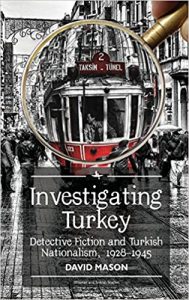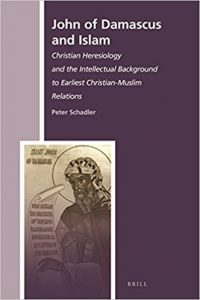David Mason. Investigating Turkey: detective fiction and Turkish nationalism, 1928-1945
Brighton, MA: Academic Studies Press, 2017. 180 pages
 This unique interpretive study seeks to examine aspects of the building of the modern Turkish Nation. In particular the transmission of Kemalist Turkish Nationalism at the level of popular detective fiction. (Mustafa Kemal Ataturk (1881-1939) – Military/Political leader; First President of Turkey). Mason argues that nationalist concepts and ideas were disseminated through the medium of this literature. After introducing the genre of detective fiction, the works of five Turkish authors are analysed and found to promote such Kemalist concepts as: 1) Hardwork or Industrious; 2) Physically fit; 3) Feminist in perspective (All Turks are to participate in the nation); 4) Rationalist; and 5) Patriotic. The book represents an approach to cultural historical studies in which publications are viewed as ‘events.’ These ‘events’ provide access to a cross section of Turkish society including values, mores and the worldview of regular citizens, or at least, attempts to shape and direct popular beliefs about what it means to be a Turk under Ataturk’s vision of the Turkish Republic.
This unique interpretive study seeks to examine aspects of the building of the modern Turkish Nation. In particular the transmission of Kemalist Turkish Nationalism at the level of popular detective fiction. (Mustafa Kemal Ataturk (1881-1939) – Military/Political leader; First President of Turkey). Mason argues that nationalist concepts and ideas were disseminated through the medium of this literature. After introducing the genre of detective fiction, the works of five Turkish authors are analysed and found to promote such Kemalist concepts as: 1) Hardwork or Industrious; 2) Physically fit; 3) Feminist in perspective (All Turks are to participate in the nation); 4) Rationalist; and 5) Patriotic. The book represents an approach to cultural historical studies in which publications are viewed as ‘events.’ These ‘events’ provide access to a cross section of Turkish society including values, mores and the worldview of regular citizens, or at least, attempts to shape and direct popular beliefs about what it means to be a Turk under Ataturk’s vision of the Turkish Republic.
David Mason 1971-2017 completed his PhD (2011) at the Institute of Islamic Studies, McGill University. He was a friend and colleague.
Peter Schadler. John of Damascus and Islam: Christian heresiology and the intellectual background to earliest Christian-Muslim relations
Leiden; Boston: Brill, 2018. 264 pages
 John of Damascus and Islam is the 34th volume in Brill’s series on the History of Christian-Muslim relations. A summary from the back cover: How did Islam come to be considered a Christian heresy? In this book, Peter Schadler outlines the intellectual background of the Christian Near East that led John, a Christian serving in the Damascus court of the caliph Abd al-Malik (685-705), to categorize Islam as a heresy. Schadler shows that different uses of the term heresy persisted among Christians, and then demonstrates that John’s assessment of the beliefs and practices of Muslims has been mistakenly dismissed on assumptions he was highly biased. By analyzing John of Damascus’ small work entitled ‘On Heresies 100’, Schadler proposes that the practices and beliefs John ascribes to Islam have analogues in the Islamic tradition, proving that John may well represent an accurate picture of Islam as he knew it in the seventh and eighth centuries in Syria and Palestine.
John of Damascus and Islam is the 34th volume in Brill’s series on the History of Christian-Muslim relations. A summary from the back cover: How did Islam come to be considered a Christian heresy? In this book, Peter Schadler outlines the intellectual background of the Christian Near East that led John, a Christian serving in the Damascus court of the caliph Abd al-Malik (685-705), to categorize Islam as a heresy. Schadler shows that different uses of the term heresy persisted among Christians, and then demonstrates that John’s assessment of the beliefs and practices of Muslims has been mistakenly dismissed on assumptions he was highly biased. By analyzing John of Damascus’ small work entitled ‘On Heresies 100’, Schadler proposes that the practices and beliefs John ascribes to Islam have analogues in the Islamic tradition, proving that John may well represent an accurate picture of Islam as he knew it in the seventh and eighth centuries in Syria and Palestine.
Schadler also includes the Greek text and English translation of ‘On Heresies 100’, which was part of John of Damascus’ larger work on heresies and offers an insightful tabulation of potential Qur’anic references in ‘On Heresies 100’. Schadler’s work is an important offering on the nascent relations between Christians and Muslims.

